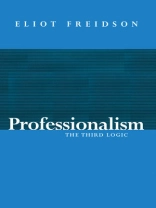Eliot Freidson has written the first systematic account of
professionalism as a method of organizing work. In ideal-typical
professionalism, specialized workers control their own work, while
in the free market consumers are in command, and in bureaucracy
managers dominate. Freidson shows how each method has its own logic
requiring different kinds of knowledge, organization, career,
education and ideology. He also discusses how historic and national
variations in state policy, professional organization, and forms of
practice influence the strength of professionalism.
In appraising the embattled position of professions today, Freidson
concludes that ideologically inspired attacks pose less danger to
professionals’ institutional privileges than to their ethical
independence to resist use of their specialized knowledge to
maximize profit and efficiency without also providing its benefits
to all in need.
This timely and original analysis will be of great interest to
those in sociology, political science, history, business studies
and the various professions.
İçerik tablosu
Acknowledgements.
Introduction.
Part One: Professionalism: the Ideal Type.
Chapter 1: Professional Knowledge and Skill.
Chapter 2: Divisions of Labour.
Chapter 3: Labor markets and Careers.
Chapter 4: Training Programs.
Chapter 5: Ideologies.
Part Two: The Contingencies of Professionalism.
Chapter 6: States and Associations.
Chapter 7: Bodies of Knowledge.
Chapter 8: The Assault on Professionalism.
Chapter 9: The Soul of Professionalism.
Notes.
References.
Index
Yazar hakkında
Eliot Freidson is Professor Emeritus of Sociology, New York University, and Visiting Professor of Sociology, University of California, San Francisco












